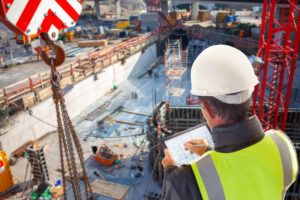The role of a construction manager requires strong leadership skills, an unwavering commitment to ethical practices, and the appropriate knowledge and experience to manage the execution of construction works.
These qualities of a good construction manager must be applied across numerous aspects of construction management. Construction managers must be able to continually act in a professional and ethical manner while also rising to the occasion of overcoming the latest challenges at the job site and in the overall construction industry.
What does it look like to continue leading in an ethical way, while also not cutting corners to achieve the ultimate objective of completing the project? Let’s examine.
9 Qualities of a Good Construction Manager
Consider what it takes to be a complete construction manager capable of using your professional work experience to strategize solutions, solve constructor problems, and lead in an ethical manner.
1. Can Develop Project Scope
Construction managers should embrace the role of a project leader and participant during the initial project development stage. This way, you can support owners by solving increasingly complex construction problems at the outset of the project. You may be asked to take on a leadership role for the entire project helping develop the full project scope:
- Project Participants Roles
- Conceptual Estimating
- Budget Monitoring
- Design Schedule
- Design Review/Recommendation Process
- Cost Analysis Design Phases
- Site Analysis
- Bid Scope Development
- Bid Document Development
- Bid Analysis and Selection/Recommendations
- Construction Contracts and Construction Schedule
2. Understands Employment Practices
Construction managers need to be able to understand, interpret, and establish employment practices for the entirety of the project. You may be asked to provide leadership for key elements such as:
- Personnel requirements
- Policies and procedures
- Job descriptions
- EEOC and ADA requirements
- Government regulations
- Communicating requirements to subcontractors and vendors
Understanding employment practices requires knowledge, strong communication, and collaborative thinking to ensure that the project adheres to employment laws, discrimination laws, construction labor laws, and management responsibilities.
3. Has Strong Working Relationships
The qualities of a good construction manager include being able to develop effective teams. This requires skills around team building, presentation and facilitation, problem-solving, and even negotiation. Developing these skills will enable you to:
- Assess team strengths and weaknesses.
- Identify risk areas and minimize risks.
- Resolve conflicts and differences.
- Analyze performance problems.
- Discuss performance and conduct effective meetings.
- Review, update, and improve team effectiveness.
- Train and educate the team.
4. Can Start up a Construction Project
Construction managers need to be effective leaders at the start of a construction project. This is critical because industry studies have found that 85% of construction projects typically go over budget. You can help minimize costs at the start-up phase through effective pre-construction planning, project site set-up, and the creation of site procedures.
You also need to be able to determine and analyze all procedural and documentation requirements for the project, including field office procedures, material receiving, quality control systems, and submittal requirements.
5. Can Manage Resources
Once the project is underway, construction managers need to establish controls over key aspects of the project. Specifically, you need controls over project progress, materials, subcontractors, tools, equipment, and personnel:
- Monitor and control shop drawings.
- Determine compliance with progress schedules.
- Maintain ongoing project records.
- Evaluate the effect of change orders.
- Monitor the use of materials, equipment, and tools.
- Communicate with subcontractors.
- Evaluate the performance of site personnel.
6. Can Keep Costs Under Control
Construction managers need to stay on top of costs throughout the duration of the project. Even if one area is under control, the project could be going over budget in other areas that could result in financial concerns for the project.
Construction managers need to have the appropriate knowledge and experience to support these critical financial functions:
- Perform cost comparison and forecasting.
- Understand changes and claims impact.
- Support change documentation
- Execute progress payment submittal.
- Produce financial statements.
7. Can Close Out a Project
Once the project is complete, construction managers need to spearhead the closeout process to successfully turn over the finished construction work to the owner. This includes following claims closeout procedures, documenting turnover, and executing final payment procedures. Construction managers need to support these closeout tasks:
- Create punch lists
- Finalize inspections.
- Determine, analyze, and resolve claims.
- Demobilize the site.
- Determine final draw.
- Implement effective closeout procedures.
8. Adheres to All Safety Requirements
Supporting safety throughout the duration of the construction project requires a proactive approach from a construction manager. A good construction manager will not cut this corner. It’s your job to ensure that everyone gets home safely from the job site and that you do not expose your company or the owner to risk resulting from an incident.
To effectively support safety, construction managers must be able to support these aspects:
- Perform a risk assessment.
- Understand worker’s compensation costs and liability.
- Interpret safety procedures that apply to the job site.
- Implement effective safety processes.
- Build the appropriate safety culture.
- Verify that personnel followed safety procedures.
9. Is Committed to Ethics
Ultimately, a good construction manager will be committed to business ethics and professional practice ethics. For too long in the industry, construction projects have been undermined by unethical behavior. To demonstrate an ethical approach to construction project management, you must be able to perform the following actions:
- Identify deceptive practices.
- Analyze breach of confidentiality.
- Define the code of conduct for the construction site.
- Define relationships with clients, engineers, architects, vendors, subcontractors, the general public, and employees.
Does This Describe You as a Construction Manager?
Since 1971, the American Institute of Constructors (AIC) has promoted individual professionalism and excellence in construction.
If you believe that you possess the qualities of a good construction manager and have the appropriate skills, knowledge, and experience in the industry, then we encourage you to apply for our Certified Professional Constructor (CPC) exam. This is your opportunity to prove a strong commitment to ethics and construction professionalism.
When you take and pass the CPC exam, you will have confirmation that you are qualified to support the full management of a construction project with integrity. CPCs receive:
- Recognition of your constructor skills and knowledge.
- The mark of professionalism to the public, your employer, and the owner.
- A framework for continuing professional development to support lifelong learning and career growth.
– We encourage you to apply today for the CPC exam. Have questions about the application process? Contact us today to find answers to your questions.




